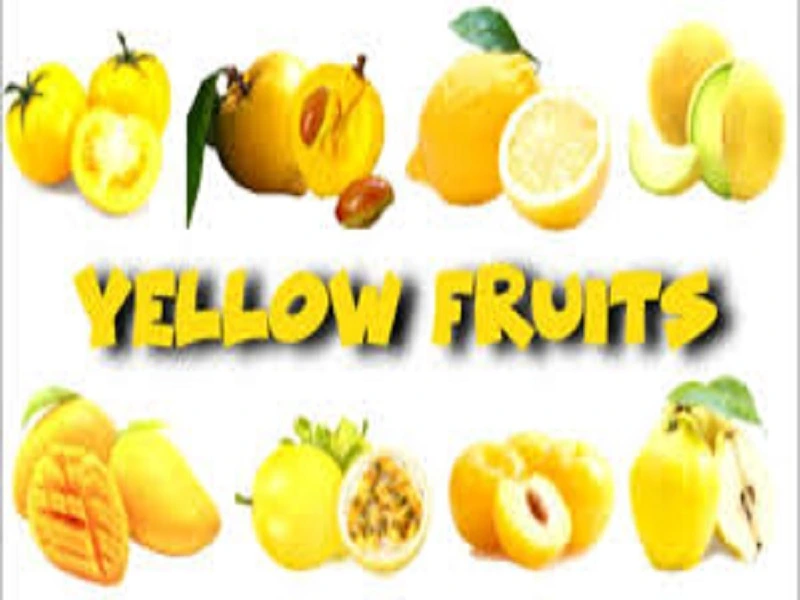
Introduction
Yellow fruits come in all shapes and sizes, ranging from small berries to large tropical wonders. Their vibrant hue is attributed to the presence of pigments like carotenoids and flavonoids. These fruits not only offer visual appeal but also boast health benefits, making them a great addition to your diet.
Bananas
One of the most popular yellow fruits, bananas are a staple in many households. Their creamy texture and natural sweetness make them a favorite for snacking and adding to smoothies. Packed with potassium and dietary fiber, bananas are a versatile and nutritious choice.
Lemons
Lemons are tart and tangy yellow fruits that are widely used for their juice and zest. They are rich in vitamin C and are often added to dishes to enhance flavor. Lemon water is a refreshing and healthful drink known for its detoxifying properties.
Pineapples
The tropical goodness of pineapples brings a burst of flavor to both sweet and savory dishes. Their juicy, fibrous flesh is a source of bromelain, an enzyme with anti-inflammatory properties. Enjoy them fresh, grilled, or blended into refreshing beverages.
Mangoes
Mangoes are often hailed as the “king of fruits” for their luscious taste and creamy texture. These succulent delights are loaded with vitamins A and C, making them a fantastic choice for promoting healthy skin and boosting the immune system.
Papayas
With their orange-yellow hue, papayas offer a tropical flavor and a wealth of nutrients. They contain papain, an enzyme that aids digestion, as well as vitamin C and folate. Papayas can be enjoyed on their own or added to salsas and salads.
Golden Berries
Golden berries, also known as cape gooseberries, are small yellow fruits encased in delicate husks. They are rich in antioxidants and vitamin C, offering a tangy and slightly sweet taste. Golden berries can be enjoyed as a snack or used as a unique topping.
Yellow Apples
While apples typically come in shades of red and green, some varieties, such as the Golden Delicious, feature a yellow skin. These crisp and slightly sweet apples are perfect for snacking, baking, or adding to salads.
Yellow Plums
Yellow plums are a juicy and flavorful summer fruit with a smooth, golden skin. They are rich in vitamins and minerals, including vitamin K and potassium. Enjoy them fresh, or use them to create jams, preserves, and desserts.
Yellow Watermelon
Yellow watermelon is a refreshing twist on the classic red variety. Its pale yellow flesh is sweet and hydrating, making it an excellent choice for staying cool during hot summer days.
Yellow Peppers
While not conventionally considered fruits, yellow peppers are a colorful addition to this list. They are crunchy, slightly sweet, and packed with vitamin C. Use them in salads, stir-fries, or as a crunchy snack.
Apricots
Apricots are small, velvety yellow-orange fruits that are rich in beta-carotene, which supports eye health. They can be enjoyed fresh or dried and make a delicious addition to both sweet and savory dishes.
Yellow Cherries
Yellow cherries, with their vibrant color and sweet-tart flavor, are a delightful summer treat. They contain antioxidants and can be enjoyed as a snack or used in various culinary creations.
Conclusion:
Embrace the Sunshine in Your Diet Incorporating a variety of yellow fruits into your diet not only adds a pop of color but also provides an array of health benefits. From the tropical allure of mangoes and pineapples to the zesty freshness of lemons, these fruits offer a diverse range of flavors and nutrients. So, go ahead and savor the sunshine with these delectable yellow fruits!
FAQs:
- Are all yellow fruits ripe when they are yellow? Not necessarily. While many yellow fruits do ripen to their full sweetness when yellow, some may need a bit more time to develop their flavor. Bananas, for instance, continue to ripen after they turn yellow, while pineapples should be harvested ripe.
- Can I eat the skin of yellow fruits like apples and apricots? Yes, the skin of yellow fruits like apples and apricots is safe to eat and contains valuable nutrients. Just be sure to wash them thoroughly before consuming.
- Are there any allergic reactions associated with yellow fruits? Allergic reactions to yellow fruits are rare but not impossible. If you have allergies to certain fruits or pollen, it’s a good idea to consult a doctor before trying new fruits.
- What’s the best way to store yellow fruits? Most yellow fruits, like bananas and mangoes, are best stored at room temperature until ripe, after which they can be refrigerated. Citrus fruits, on the other hand, can be stored at room temperature or in the fridge.
- Can I freeze yellow fruits for later use? Yes, many yellow fruits can be frozen for later use. Simply wash, peel, and slice them before freezing. Frozen fruits are great for adding to smoothies or making desserts.

